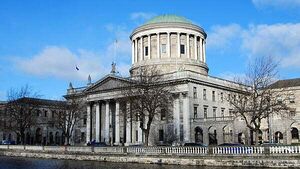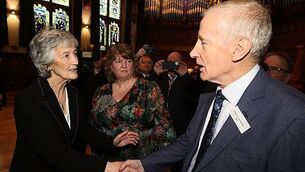Labour councillor challenge to Seanad election result dismissed by High Court

Ann O'Loughlin
The High Court has dismissed a petition brought by a failed Seanad candidate seeking a full recount of ballots cast in the recent agriculture panel election.
In a judgment, Mr Justice Micheál O’Higgins on Wednesday found Labour councillor Angela Feeney failed to prove the Seanad returning officer was unreasonable in not directing the recount and failed to prove the count was conducted in a manner that was not transparent.
Ms Feeney, a councillor based in Co Kildare, sough to challenge the outcome of the election after she was eliminated on the 23rd count by a margin of 116 votes – or about one-ninth of a ballot.
Each valid Seanad ballot is deemed to have a value of 1,000 votes.
Ms Feeney had argued that returning officer Martin Groves was unreasonable in refusing her request for a full recount, in circumstances where an extremely narrow margin separated her and the final candidate to be elected to the panel, Fine Gael’s Maria Byrne.
Ms Feeney also claimed the returning officer failed to conduct the count in a transparent manner.
She contended that counts took place at a table away from the candidates and their agents, impairing oversight.
Flowing from these complaints, Ms Feeney’s case alleged that the count was not conducted in accordance with rules provided for in the Seanad Electoral (Panel Members) Act 1947.
Both complaints, individually and cumulatively, constituted a mistake or irregularity likely to impact the result of the election, Ms Feeney’s case argued, in contravention of the Electoral Act 1992.
Ms Feeney’s case was against Mr Groves and the successful candidates elected to the agricultural panel. The Minister for Local Government, the Attorney General and the Director for Public Prosecutions were notice parties.
In his judgment, Mr Justice O’Higgins said the central legal issue to be decided was the correct interpretation of Rule 14 (2) of the 1947 act, which pertains to requests for recounts in Seanad elections.
Lawyers for Ms Feeney argued that the rule provides that the returning officer can exercise discretion in conducting a recount. They submitted the returning officer is untrammelled by a requirement to be unsatisfied about the accuracy of the count in ordering an initial recount.
Counsel for the respondents disagreed, arguing that the returning officer can only order a recount if they are not satisfied with the accuracy of a count.
The judge agreed with the respondents, finding the correct interpretation of the rule gives the returning officer “discretion to order a recount, provided he is not satisfied as to the accuracy of any count”.
Addressing Ms Feeney’s complaint about transparency at the count, the judge found it was not “evidentially sustained”.
The judge said Ms Feeney’s case established that her view of the vote-counting was impaired “on occasion”.
However, the judge said this issue could have been addressed at the count centre by bringing it to the attention of the returning officer, “thereby giving him a fair opportunity to address the complaint”.
Given the issue was not raised at the count centre, the judge said it seemed it was not a “top-of-the-order” complaint.
“It would in my view be unfair to the returning officer and his staff, and also to those candidates who were successful in the election, to invalidate the election on account of the transparency issues raised, without at least giving the returning officer an opportunity to address the complaints on site,” he said.
The judgment also found that Ms Feeney’s side did not prove their “fallback” argument, that even if the returning officer must be “not satisfied” with the accuracy of a count to order a recount, no reasonable returning officer would have refused a recount in the circumstances of this case.
The judge listed several reasons for this decision, including that no-one suggested the returning officer did not make the decision in good faith, and no candidate identified an error during the count process.
The case will return to court next week.





